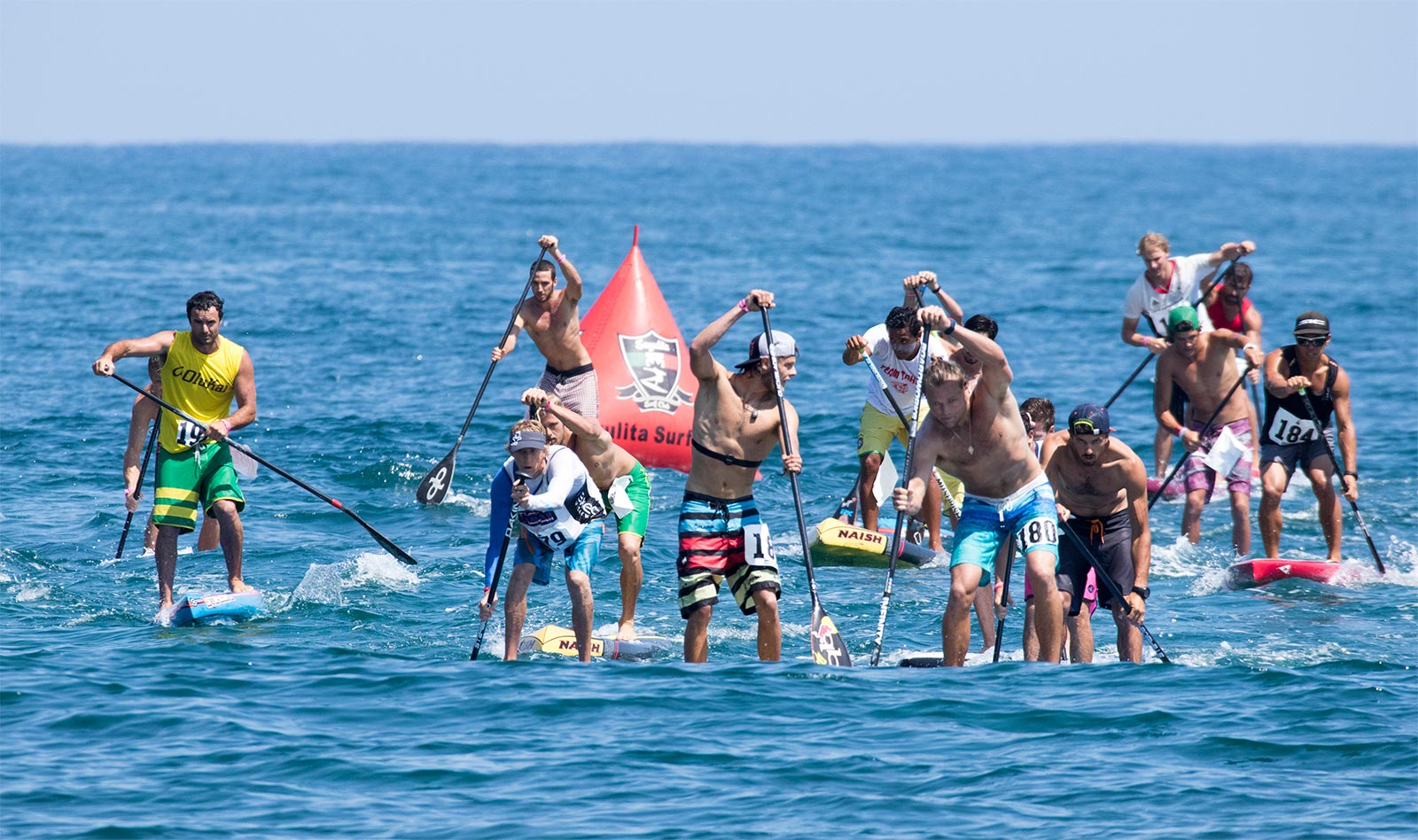
Olympic Tug of War: International Canoe Federation Challenges ISA’s Role as Stand Up Paddling’s Official Governing Body
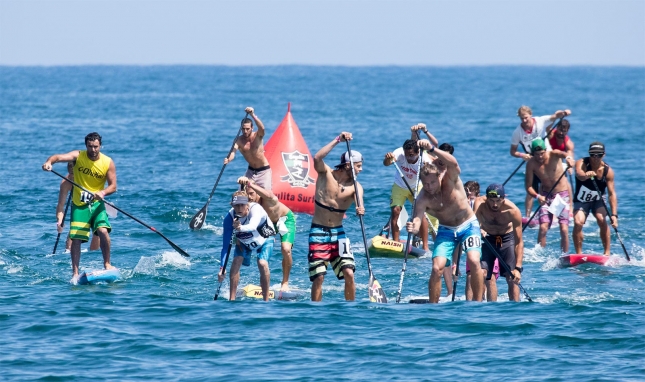
Is stand up paddling considered surfing or canoeing? The debate is currently raging in the Olympic world. (photo: ISA)
In a major development that could drastically alter the future direction of our sport, the International Canoe Federation (ICF) has challenged the long-standing assumption that the International Surfing Association (ISA) is the Olympic-level governing body of stand up paddling, staking a rival claim and forcing a gridlock that has left SUP communities in limbo and blocked a potential inclusion in the 2018 Youth Olympics.
Despite the ICF’s apparent lack of involvement in the sport, there’s actually been a gentle, behind-the-scenes arm wrestle between surfing and canoeing for several years. However the issue suddenly became an all out tug of war and spilled over into the public arena when the ISA pushed for SUP to be included at next year’s Youth Olympic Games in Buenos Aires.
This initiative triggered the ICF to dispute the ISA’s authority with the International Olympic Committee (IOC), which effectively killed the potential Buenos Aires bid. At the same time, the ICF began urging its national members to assert domestic authority over the sport in order to build canoeing’s case for worldwide control of the sport.
At stake: the right to govern the world’s fastest-growing water sport inside the Olympic realm.
Or in other words: this is what “paddletics” looks like at the highest level.
Since the story began to break a couple of weeks ago, I’ve been speaking to both the ISA and ICF, chatting with dozens of athletes and industry figures, and digging through years worth of stats to build a comprehensive picture of exactly what’s happening.
Buckle up.
• PART 1: Competing Claims
• PART 2: Peace Talks End in Deadlock
• PART 3: SUP Communities in Limbo
• PART 4: Which Side is Right? (Analysing the Competing Claims)
◦ Argument #1: Active Development
◦ Argument #2: “Is That a Canoe or a Surfboard” (Board Design)
◦ Argument #3: History & Tradition (The Roots of SUP)
• PART 5: The Only Argument That Matters: Who Would Govern Best?
Part 1: Competing Claims
The ISA, which has worked to develop stand up paddling since its inaugural World Championship event more than half a decade ago, views the move by canoeing’s governing body as a hostile takeover, arguing that not only does SUP have its roots in surfing but the ICF has virtually no track record of development and is only now interested because SUP is exploding in popularity.
The ICF, which governs the canoe/kayak events at the Olympic Games along with several other non-Olympic paddling disciplines, counters that any water sport with a paddle automatically falls under its umbrella, i.e. their first line of reasoning is that SUP should be an ICF discipline by default.
In addition to this argument, and despite its own lack of direct involvement on the global stage, the ICF contends that its member nations have been very active in running SUP events for years, to which there is indeed some truth but clearly not on the same level as the ISA and its own national affiliates.
(On the flipside, it’s worth noting that the ICF is a far more established sporting federation within the Olympic movement: Canoeing has been in the Olympics for 80 years; surfing only got the green light 8 months ago. But whether that experience translates into effective development of SUP is another matter entirely.)
A third line of attack by the ICF has been that stand up paddling is essentially stand up canoeing, particularly with regards to board design, which again contains some plausible logic but ignores our sport’s immense connection with the surfing world.
Both organisations have told me they’re 100% committed to helping develop the sport and making SUP racing an Olympic discipline, so if there’s one positive to take away from this saga it’s that SUP racing is clearly a strong candidate for a future Olympic Games–why else would the ISA and ICF be fighting over it so hard?
Although Surfing has been far more active within our sport, Canoeing’s move should come as no surprise. Stand up paddle boarding is often cited as the fastest-growing water sport in the world, and in many nations it’s already far more popular than both canoe/kayak and regular surfing.
If sport is indeed a business, then SUP is a highly valuable young start-up.
And just like in business, we need to remove emotion from this debate and look at it through a neutral lens.
We must analyse which federation can best guide SUP down the Olympic path, and also which one can help develop the wider sport alongside the core community and big events that have been leading our sport forward for many years. Because while the Olympics are a grand goal, let’s not forget that they’re only one part of a much broader landscape.
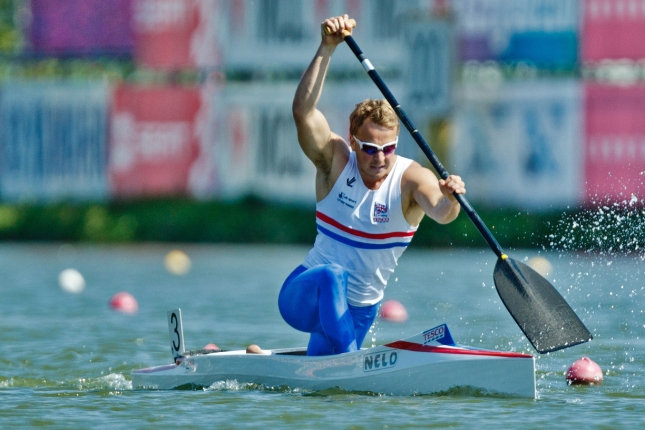
Britain’s Richard Jefferies competing in the “high kneel” sprint canoe event also known as C1 (photo credit: Royal Canoe Club)
Part 2: Peace Talks End in Deadlock
After the challenge by the ICF, the IOC was asked to mediate the dispute. This included a high-level meeting in January at Olympic headquarters in Lausanne, Switzerland between members of the IOC Executive Board, including President Thomas Bach, and the Presidents, Vice-Presidents and secretary/director generals of the ISA and ICF.
Each side presented their argument but no decision was made.
The case is officially listed as “pending” within the IOC, however the Olympic Committee has essentially told the two federations to sort it out between themselves.
Publicly, both the ISA and ICF are putting up a polite front and saying they’re all friends and that they’re willing to talk and find a solution, however behind the scenes there’s a growing sense of frustration, particularly from the ISA who view this as a political power play that is damaging the sport they’ve worked hard to help develop.
If no resolution is reached in the coming weeks, the case could potentially end up in the high-profile Court of Arbitration for Sport, an unprecedented position for our humble sport but one that highlights just how much is at stake here.
And while this may seem like old men in suits arguing behind closed doors miles away from the beach about a fairly distant issue – this won’t change what happens on the shores of Carolina or Dana point, and SUP in the Olympics is 7 years away at best – the impact of this gridlock is already being felt.
Part 3: SUP Communities in Limbo
The most obvious fallout is a missed opportunity for Buenos Aires 2018. The Youth Olympic Games would have not only been a big event but might have also acted as a stepping stone to the 2024 Olympics proper. Closer to home, this dispute has stalled the progression of the sport in certain nations, particularly those that rely heavily on government funding for sports development.
Take Denmark for example.
When I spoke with ISA Vice President and leading international athlete Casper Steinfath, the normally calm and relaxed ‘Viking’ was clearly frustrated. Although he carries a clear bias as an executive member of the ISA, Casper is first and foremost an athlete and is considered one of the most respected ambassadors our sport has. So we probably should listen to him.
Casper labeled the situation in his home country “sad,” explaining how the Danish SUP community, due to its association with the ISA, was set to receive government funding to help train athletes, organise events and develop paddleboarding clubs around the country.
There was excitement. There was buzz. And then suddenly there was nothing, because that money was put on ice and several projects were thrown into limbo when the Danish canoe association, under the direction of the ICF, objected to the Danish surfing association’s role as SUP’s governing body within the country.
While the Danish surfing association, which Casper helped establish, has a clear track record of organising SUP events and helping develop the sport, the Danish National Olympic Committee (NOC) said the matter needed to be resolved by the IOC before it could proceed.
Of course the great irony here is that Denmark will be hosting the ISA World Championship in September.
Given that surfing is now an Olympic sport (which often means automatic government funding for the national federation), the Danish scenario is currently playing out with other NOCs around the world. The situation won’t be resolved until either the IOC makes a decision or surfing and canoe reach an agreement between themselves, the latter of which seems increasingly unlikely at this point.
And again, while the Olympics is only one small and distant part of our sport – we have other, more pressing issues that need to be addressed before we can even think of being ready for The Games – there are critical wheels being turned right now that will help shape SUP’s direction for many years to come.
So we kind of need to figure this thing out.
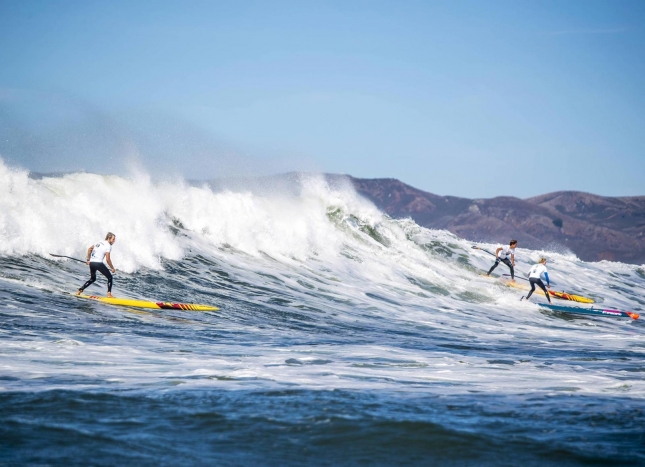
Casper Steinfath (left) along with fellow superstars Connor Baxter and Kai Lenny during the 2016 Red Bull Heavy Water event in San Francisco (credit: Waterman League)
Part 4: Which Side is Right? (Analysing the Competing Claims)
If you’ve been following SUP Racer for a while, you’ll know I’ve sometimes been a critic of the ISA, occasionally getting frustrated at what I view as a slow pace of development.
However one thing I can safely say is that the ISA is developing our sport, and that it’s heading in the right direction while continually increasing the resources it dedicates to stand up paddling. It may not always move as fast as we want, but it’s definitely moving and definitely doing a good job.
But while I’ve said many times that the ISA needs a stronger connection with the core SUP community, the ICF doesn’t appear to have any connection with the core community.
To highlight this point: I searched my inbox for ISA correspondence and found 162 results from the past six years, not to mention the countless discussions I’ve had with the ever-passionate ISA President Fernando Aguerre and his executive members on the beaches of Peru, Nicaragua, Mexico and Fiji about how we can all work together to develop this great sport. In other words: The ISA has been very active over the past half a decade.
The first time I ever had any contact with the ICF was last week.
Now of course SUP Racer isn’t the be all and end all of SUP racing, but from my discussions with athletes and industry figures there’s a clear theme emerging: The ICF just doesn’t have any real connection with the SUP racing community.
As I see it, the ICF has come late to the party and therefore has to either prove a very strong case or move aside and let the ISA continue doing its good work. So let’s analyse each argument the ICF has raised and see if we can make some sense of this whole debate.
Argument #1: Active Development
One of the main points the ICF has pushed over the past few weeks is that, contrary to popular opinion within the SUP community, it was actually canoeing and not the ISA that first started organising events with the goal of taking our sport to the Olympics.
While no specifics are given, the Federation’s Secretary-General was quoted by the BBC as saying “The ICF has been involved in the sport for a number of years and did not start last year. Many of our federations have the sport recognised by their National Olympic Committees running national and international competitions.”
The thing about that argument is that while it’s technically correct, it deliberately ignores the fact that the ISA has been even more active on a national level (and far more active on the international stage).
I dug through SUP Racer’s archive of more than 600 race results, while also searching through many of the smaller domestic events we never covered, to see what the numbers say.
The basic summary is that, statistically-speaking, the ISA and its member nations are at least 10x more active in organising SUP races at a domestic level, with approximately 100 events scheduled around the world this year that are connected with the ISA to some degree.
There are at least three dozen countries that have at least one major national qualifying event specifically for the ISA World Championship, while the surfing federations in places such as France and Spain run year-long SUP racing tours to not only select their teams but help grow the sport in general.
(Some countries go even further, with virtually every SUP race, whether it be at a national or local level event, automatically affiliated with the surfing federation–so my researched estimate of 100 events could actually be quite conservative.)
And this doesn’t even include SUP surfing contests, which I presume the ICF has no interest in but which clearly go together with SUP racing in many parts of the world.
On the canoeing side of the debate, the evidence is sparse. I searched the ICF’s event database for the newly-added ‘stand up paddle’ discipline, however there were no results. I did find a few examples of canoeing-affiliated SUP events through national canoe associations, though it was often where stand up was added as a minor addition to an established canoe/kayak event (as opposed to the ISA affiliates that usually run domestic SUP races as dedicated, standalone events that likely do a lot more to help develop the sport).
To credit the ICF, the sport of canoe racing is far more established than SUP in certain countries around the world, particularly in the kayak powerhouse nations of Eastern Europe and the strong dragon boat countries of Asia.
But to counter that, the ISA told me they would be happy to work with national canoe federations to grow the sport and select teams for the ISA World Championship in countries where surfing has no representation (however they also made it clear there will be no compromise with the ICF about who is the official governing body at the international/Olympic level).
So while the ICF is technically correct to argue that some of its member nations have been promoting stand up paddling as a canoeing discipline, by taking that line they’re actually playing right into the ISA’s hands, because the various national surfing associations have been far more active in organising and sanctioning races.
Finally, on a global level, the only elite international SUP race ever sanctioned by the ICF was the 2016 Lost Mills. This is more than just a footnote: The Lost Mills was once the biggest (or at least most competitive) race outside of the USA, however this year it’s dropped significantly from a 4-star to a 2-star event. While I don’t think its association with the ICF was the reason why many elite athletes suddenly abandoned the event, it’s not a particularly strong endorsement either.
I also spoke with the Lost Mills organisers and they told me that while the 2017 race is tentatively scheduled to be ICF-sanctioned again, they were open to the possibility of either working with the ISA or simply just returning to a neutral status next year.
As opposed to the ICF, the ISA’s work on a global level is quite clear: They’re currently preparing for their 6th Annual ISA World SUP and Paddleboard Championship, scheduled for Denmark in early September. This follows half a decade of work that has produced five large-scale, multi-discipline events from Peru (2012, 2013) to Nicaragua (2014) to Mexico (2015) to last year’s memorable showdown in Fiji.
Argument #2: “Is That a Surfboard or a Canoe?” (Board Design)
In presenting their case to the IOC, the ICF has argued that SUP race boards are essentially designed as stand up canoes, not surfboards. But just like the ‘development argument’ above, while there’s some truth to the ICF’s claims there’s far more evidence to suggest a board design connection with surfing.
The basic argument behind ‘SUP race boards = canoes’ is that many board manufacturers have started adding specialty “dugout” models to their range. These are particularly popular in downwind racing (see the Starboard Ace), however this style of board only makes up a tiny fraction of the total race board market.
I analysed the numbers from open and elite race participation where board brand/model was available, and the stats suggest less than 4% of boards “look like a canoe.” Or to put it another way: more than 96% of race boards look like oversized surfboards.
So again, the ICF is actually helping the ISA make its case by pushing this board design argument.
You also have to ask where the line gets drawn between what is a surfboard and what is a canoe, as things could get blurred very quickly. I think it’s more plausible that SUP race board design came out of traditional prone paddleboarding, which is a sport that has a direct link to the surfing world. Indeed, even the very board that led the so-called “SUP canoe” design trend (and therefore gave the ICF ammunition), the Starboard Ace, was designed by one of the world’s foremost prone paddleboard shapers and an avid surfer, Brian Szymanski from southern California.
Finally, the most popular SUP racing discipline for these dugout “canoe” boards is downwind racing, a discipline of stand up paddling that requires paddlers to surf on open ocean swells.
So the ICF can argue that “anything with a paddle is a canoe sport” if it really wants, but it will have a very tough time trying to convince the world that SUP race boards are canoes.
Argument #3: History & Tradition (The Roots of SUP)
This line hasn’t been pushed so much by the ICF as much as the ISA has used it as a defense, with the latter claiming that stand up paddling was born out of surfing.
The “SUP = surfing” argument is indeed a smart angle for the ISA to push in this debate, because anyone that knows their SUP history will know it was surfer Laird Hamilton who popularised the modern version of stand up paddling circa 2001 (SUP the Mag has an excellent look at the early days of our sport).
Stand up paddling wasn’t even a racing sport to begin with, it was simply a new form of surfing where Laird would play around in the surf in Hawaii and California on an oversized surfboard with a paddle in his hands. From there, the “sport” evolved into downwind paddling, where Laird and his friends surfed the open ocean swells along the north coast of Maui the same way that traditional prone paddleboarders had done for many years.
The racing side of SUP didn’t begin until a few years later when some of the early-adopters piggybacked on traditional prone paddleboard races. The first ever SUP races (circa 2004) were sub-divisions of existing prone events, and prone itself is an offshoot of the surfing community with roots going back to surfboard and lifeguard rescue board races in Hawaii in the 1910s/1920s and then in Australia in the 1930s.
So either way you look at it, whether you credit Laird or the prone community, SUP racing has a strong connection to surfing.
And finally, the link between the early 1900s and the modern version that Laird pioneered comes from another surfer, the iconic Waikiki beach boy and perhaps the “grandfather of stand up paddling,” John Zapotaky (pictured below).
So while the “Active Development” and “Board Design” arguments already lean toward the ISA, the scales swing heavily in surfing’s favour when the topic of “History & Tradition” is included.
The only realistic line of attack the ICF could take in this debate is that “all paddle racing disciplines belong to the ICF by default,” however that would be a very black & white approach that ignores all of the facts above.
Perhaps the only real question to ask is: Who is best positioned to help guide the sport forward?
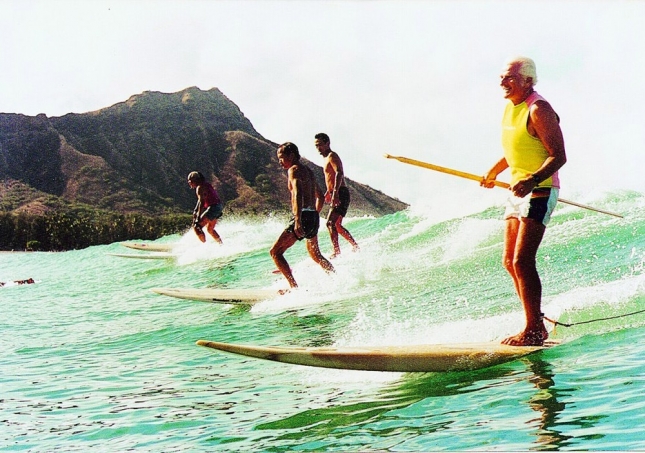
The Grandfather of SUP: John Zapotaky (photo credit unknown/sourced via SUP the Mag)
The Only Argument That Matters: Who Would Govern Best?
While the clear narrative here is a somewhat-inactive ICF attempting to take Olympic-level control over from the clearly-active ISA, it should not be lost that neither federation is currently viewed as the authoritative governing body by the core SUP community.
The ISA has always been viewed as slightly removed from the core community, something I’ve actively lobbied the Association to rectify (the good news is they’re listening). But while the ISA is viewed at a distance, the ICF is barely viewed by the SUP community at all.
Surfing’s governing body is at least on the same beach as the SUP community; the ICF isn’t even in the same state.
The Canoe Federation seems far removed from our sport, and while their Secretary-General was open and willing to chat with me about this story, I just can’t see how they can possibly argue they have a more authoritative connection to stand up paddling than what the ISA has already established.
The ICF’s position seems far-fetched to say the least. Based on the evidence above, the only logical outcome I see is for the ISA to be recognised as the official governing body of SUP by the IOC.
However I’m also hoping this battle with the ICF will act as a wake-up call for the International Surfing Association to become more involved with the sport and implement some of their long-overdue initiatives.
While it’s a country mile ahead of the ICF in terms of engagement, the ISA still needs to work more closely with the core community and third party event organisers that built SUP racing to begin with (see: The Majors, The EuroTour, The APP, etc).
There may also be room for compromise between surfing and canoeing on a domestic level, where some of the stronger national canoe federations could help develop SUP in countries where there’s little or no surf culture. Many nations already combine several different water sports (such as rowing, canoeing, kitesurfing, SUP, regular surfing, etc) because each one is too small to succeed on its own — the recent success of Bangkok’s first ever SUP race, which was well supported by the Thai rowing and canoe federation (separate federations on the international level) is a perfect example.
I also think it would be wrong to say “SUP is surfing and nothing else.” SUP is indeed surfing, but all of us that paddle are friends that share a common bond and love of the water, whether we paddle standing, sitting, laying down or on one knee.
And while the ICF’s actions may be viewed as hostile to many in our community, we should take it as a compliment that a powerful sporting federation is so interested in our sport, even if their connection is weak.
But either way, I’m going to leave the final word in this debate (at least for today) to Jim Terrell from Quickblade Paddles.
Jim has been involved in the SUP community as an athlete, coach, manufacturer and father figure since the very beginning. He was on the podium at the first ever Battle of the Paddle waay back in 2008 (generally considered “year zero” for our sport), he coached Team USA at the ISA Worlds twice, while the company he founded makes the “Ferrari of paddles” that are revered in the SUP racing world as the finest equipment money can buy.
As if that wasn’t enough, Jim also competed in 3x Olympics (and attended a fourth Games as a reserve) in C1 and C2 sprint canoe, which is governed by the ICF. He gave two decades of his life to the canoeing world, just as he’s dedicated the past decade to the SUP community.
Or in other words: Jim Terrell is probably better positioned to comment on this story than anyone else in the world.
Jim is also a clairvoyant, correctly predicting this whole ICF/ISA tug of war when I first chatted to him about SUP in the Olympics way back in 2012. That was at a time when the ISA had only just hosted its first World Championship and the ICF hadn’t even made a splash yet, but Jim was already suggesting that the more popular our sport becomes, the more likely the ICF will be to flex its muscles and try to outmaneuver the ISA.
I caught up with Jimmy this week and had a long chat to get his insights on the current state of the Olympic debate. He told me some fascinating stories about the rapid growth and eventual decline of his beloved marathon and sprint canoe racing throughout the 70s, 80s, and 90s, and even drew parallels between the ISA/ICF saga and the fight within the American canoeing community back in the 70s.
The “Mad Scientist of SUP” also gave me his in-depth opinion on what makes a good SUP race, what the sport is doing right/wrong and the opportunities it’s clearly missing out on (there could be a whole nother article on this alone).
However Jim had one simple message to summarise the whole ‘Olympic governing body’ debate:
“I think we should take the emotion and technicalities out of this debate and simply look at which organisation can make SUP more appealing, more sustainable and more successful in the long run. And while my roots are in the canoe world, I just don’t think the ICF would make our sport particularly ‘sexy’ or exciting if they were in charge.
What makes SUP so appealing to so many is its connection to surfing and the ‘cool factor’ that brings with it. If we want a healthy future for our sport, I believe we really need to emphasise this, and so I think the ISA is our best bet for growing SUP racing into a truly viable sport in the Olympics and beyond.”
Wise words from a true icon of our sport.
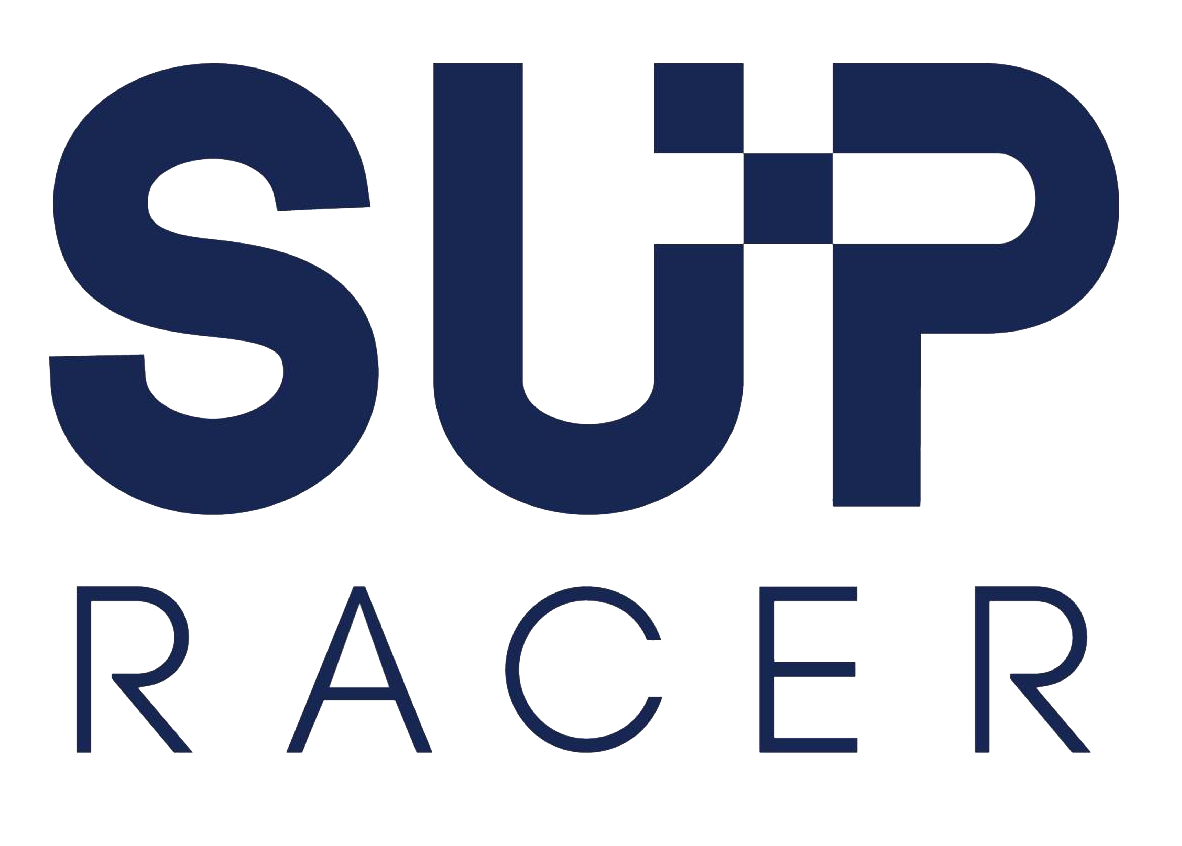


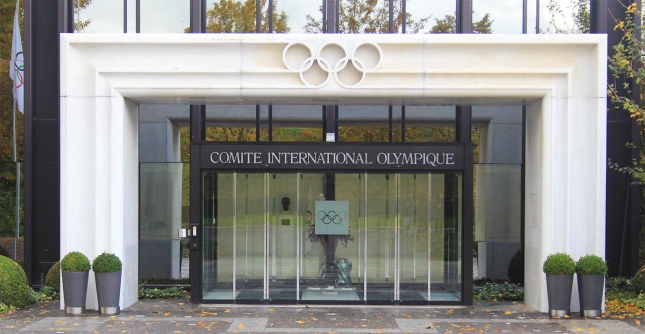
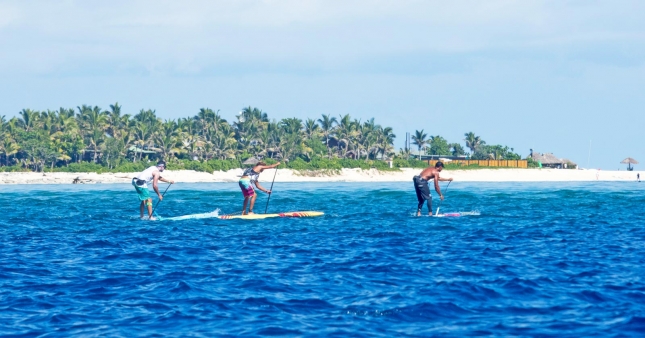
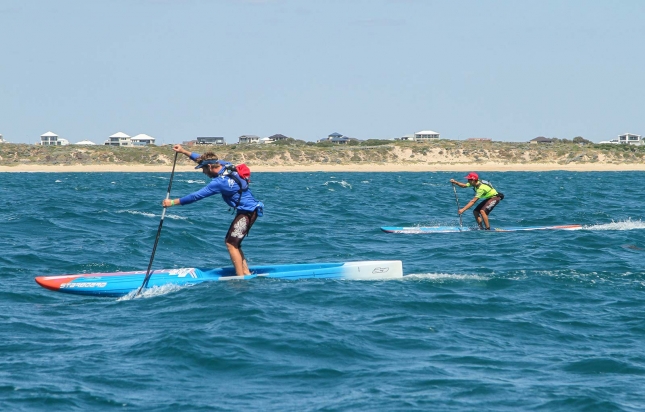
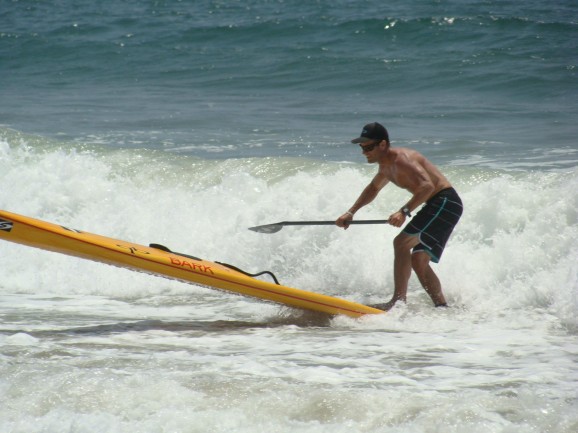
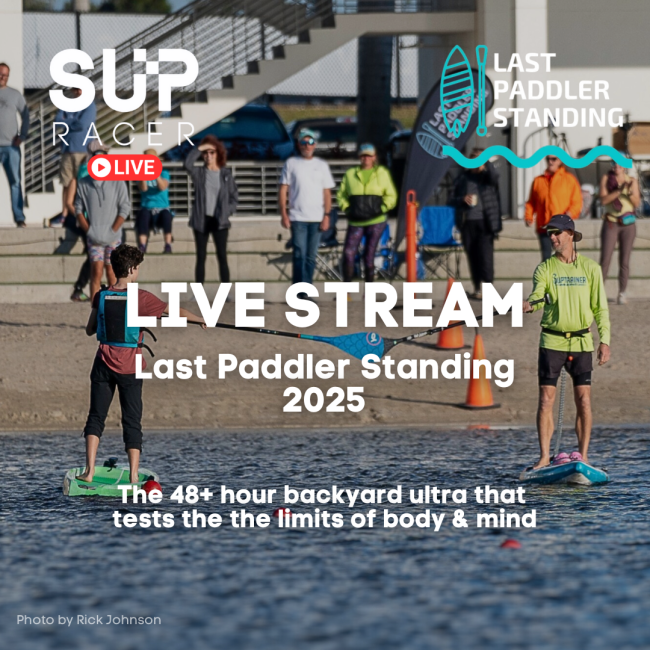
You must be logged in to post a comment.